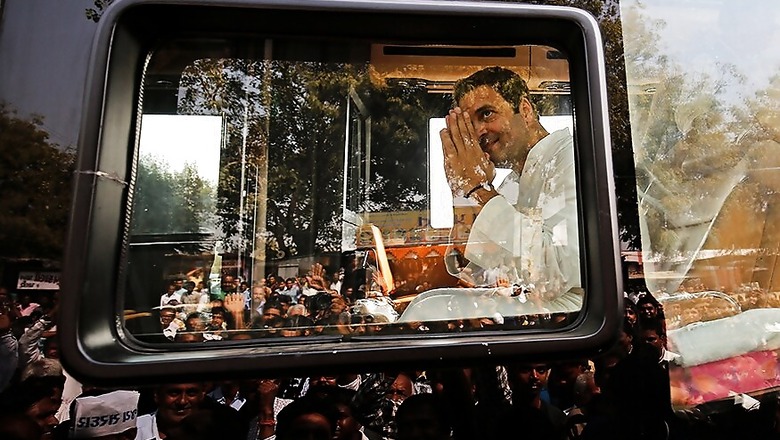
views
To concede or not to concede. And how much to concede is the question that the Congress faces as it firms up its alliances for states and Lok Sabha polls next year.
By a strange paradox, Congress, which may emerge as the single largest block in the opposition camp, is unsure of its status in the proposed national alliance against the BJP.
The grand old party has had to increasingly play ball to the hopes and aspirations of several regional satraps keeping aside its ambitions. The fact is that it can lay just claim to the top executive post in the country, but has to play coy.
Ideally, Congress should have been the natural leader of an anti-BJP front at the national level after leading the United Progressive Alliance at the Centre for 10 years. But such are the circumstances that after Congress’ defeat in the general election in 2014 followed by successive defeats in a string of state polls, the party lacks a credible face at the national level.
Rahul Gandhi’s prime task at hand is to deny a second term to Prime Minister Narendra Modi. The Congress strategy to stop Modi at any cost – also evident in Karnataka concessions Congress has had to make - has emboldened a number of regional leaders who feel that there is more than an opportunity for them post the Lok Sabha polls.
The first and prime target for the Congress is to get a minimum of 100 seats in the 543-member Lok Sabha. But will that be enough to make non-BJP parties like the Trinamool Congress, Biju Janata Dal, TDP, BSP, Samajwadi Party, NCP, Janata Dal (S), DMK, TRS, AAP and the Left back the grand old party to form a government.
The answer as of today is an emphatic ‘No’. This is because each one of them would want the Congress to return the favour in equal measure this time around. Congress has for long enjoyed the prime ministership in the UPA times, is the refrain one gets to hear from the leaders of these parties in private.
BSP supremo Mayawati, West Bengal chief minister Mamata Banerjee and the NCP chief Sharad Pawar are seen as potential candidates for the prime minister’s post among the non-Congress parties opposing the BJP openly.
Even as it shows marked willingness to accommodate regional aspirations, Congress also cannot afford to say it does not have a prime ministerial candidate. Or for that matter declare Rahul Gandhi is not in the fray for the top executive post of the country.
Mayawati can become a serious PM candidate if her party is able to win seats from outside UP, especially Madhya Pradesh, Rajasthan and Chhattisgarh. And this can be possible if the Congress leaves 'some' seats for the BSP in the Lok Sabha elections and the coming Assembly polls.
While the BSP has been known for opposing pre-poll alliances and prefers post poll bargains, Narendra Modi’s juggernaut is compelling Mayawati to re-calibrate her strategy. And its success in the Lok Sabha bypolls in Uttar Pradesh has emboldened the BSP.
Congress’ dilemma lies in the compulsions of joining hands with the BSP outside UP which would entail conceding space to Mayawati in those very provinces where it is still strong and has a pan-state footprint. The grand old party has been out of power in Tamil Nadu, West Bengal, Uttar Pradesh, Bihar for more than two decades, it has been relegated to third position in Odisha and is out of power in Madhya Pradesh, Chhattisgarh for nearly 15 years.
The Congress’ 'middle path' strategy and the capacity to accommodate all sections of the society continues to remain a potential political threat to the BJP.
The regional parties, which have been using pressure tactics to gain more seats from the Congress in North, Central and Western India, may indirectly benefit the BJP in the long run. This is because it is difficult for regional parties to emerge as an alternative to the BJP at the national level.
Rahul Gandhi thus faces an unenvious task of keeping the anti-BJP parties in good humour without giving up too much in the bargain.
Months ahead would show how the political pitch would turn.
(The writer is a senior journalist. The views expressed are personal)

















Comments
0 comment